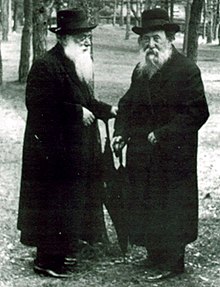| Revision as of 20:50, 9 September 2006 editTLMD13 (talk | contribs)134 editsm →Works and responsa: replaced 'shut' acronym with full words -- hope that's okay.← Previous edit | Revision as of 11:26, 26 January 2007 edit undoChesdovi (talk | contribs)Autopatrolled, Extended confirmed users22,098 edits added imageNext edit → | ||
| Line 1: | Line 1: | ||
| ]]] | |||
| Rabbi '''Chaim Ozer Grodzinski''' (]-]) was a world renowned pre-war ], ] and ]ic scholar in ]. | Rabbi '''Chaim Ozer Grodzinski''' (]-]) was a world renowned pre-war ], ] and ]ic scholar in ]. | ||
Revision as of 11:26, 26 January 2007

Rabbi Chaim Ozer Grodzinski (1863-1940) was a world renowned pre-war Dayan, Posek and Talmudic scholar in Vilna.
Early years
Rabbi Grodzinski was born in 1863 in Iuje, Belarus, a small town near Vilna where his father served as Rabbi for forty years, preceded by his grandfather who had also been a Rabbi there for a similar length of time. Rabbi Chaim Ozer was gifted with an infallible memory - never experiencing "forgetting", as he himself remarked, until his old age.
At fifteen, he went to the world-renowned Yeshiva of Volozhin. In spite of his tender age, he was immediately accepted into Rabbi Chaim Soloveitchik's select group. By the age of twenty, when he passed through Vilna, his fame preceded him. He followed the suggestion of his father, a pupil of Rabbi Yisrael Salanter, who advised him to marry the daughter of Rabbi Lazer (Eliezer Eliyahu) Grodzinski, son-in-law of Rabbi Salanter and a the Dayan in Vilna.
Leadership
Rabbi Grodzinski had expected to engage full-time in Torah study in his father-in-law's house, but after two years Rabbi Lazer died, and the community of Vilna requested him to take his father-in-law's place. Since the time of the Vilna Gaon, Vilna never had an official rabbi. Instead, a group of Dayanim (rabbinical judges) formed the rabbinate, all of whom were elderly and great scholars and Poskim. Now the twenty-two year old Rabbi Grodzinski joined their ranks and over the following fifty-five years emerged as the unofficial Rabbi of Vilna, for it was apparent from the start that his vast Torah knowledge was complemented by great wisdom.
While Rabbi Chaim Ozer did have a yeshiva, it was not a yeshiva in the usual sense, for he could not give the students much of his time. The group studied independently, and only on Shabbos would the boys gather in his home for discussions. In spite of the limited hours he spent with his pupils, he had vast influence over them and a number of great men emerged from his Kibbutz - among others, Rabbi Moshe Shatzkes, Rabbi Eliezer Silver, Rabbi Avigdor Amiel (Tel Aviv), and Rabbi Yechezkel Abramsky. Rabbi Grodzinski was also the uncle of Rabbi Eliyahu Eliezer Dessler.
Agudath Israel
Rabbi Chaim Ozer was one of the founders of Agudath Israel and the pillar of the movement throughout his life, participating in every Knessia Gedolah (great convention) as long as his health permitted. He was also honorary president of the movement. When the Moetzes Gedolei HaTorah was established, he was the first chairman and remained so throughout his life.
When his pupil Rabbi Eliezer Silver became the founding president of Agudath Israel of America, he sent personal greetings. Moreover, he instructed Rabbi Shlomo Heiman, revered Rosh Yeshiva of Mesivta Torah Vodaath, to participate in the first American Agudath Israel Convention in Far Rockaway in 1937, and to accept the vice-presidency of the budding organization. Rabbi Heiman customarily shied away from public affairs, but Rabbi Grodzinski urged him to make an exception.
Rabbi Grodzinski was a founding member and administrator of the Vaad HaYeshivos in Lithuania. He also established a network of Jewish schools that provided traditional Jewish education and the Agudas HaRabbanim of Poland.
The Chofetz Chaim would not initiate any public action, or sign any public document, until he consulted with Rabbi Grodzinski, considering him to be a living embodiment of Torah. Rabbi Grodzinski died in 1940 after a protracted illness, thought to be cancer. His death prompted massive grief and a huge funeral was held, attended by most of Lithuanian Jewry and many war refugees from Poland, led by the most eminent rabbis of the time.
Works and responsa
Rabbi Grodzinski's brilliance as well as the scope of his leadership are reflected both in the sha'alos (halachic queries) that were sent to him from all parts of the world and in the responsa he sent in return. He would write each responsum personally, not entrusting this to a secretary. His mind was so disciplined, that he would simultaneously write a responsum in halachah, give orders to two secretaries, and speak on the telephone. Rabbi Grodzinski was known to use an electric bulb in place of a havdalah candle, in line with his opinion that in Halachic terms, electricity constitutes a fire. Rabbi Grodzinski authored:
- She'elot uT'shuvot Achiezer, a three-volumed collection of responsa
External links
- Rabbi Chaim Ozer Grodzinski, tzemachdovid.org